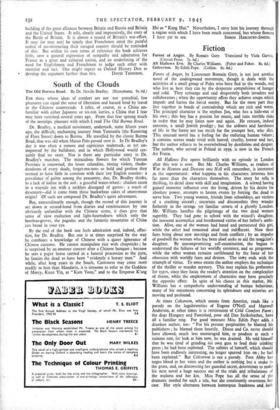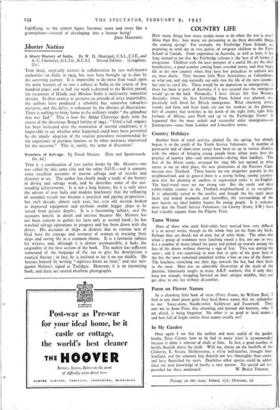Fiction
Forest of Anger. By Romain Gary. Translated by Viola Garvin. (Cresset Press. 7s. 6d.)
All Hallows Eve. By Charles Williams. (Faber and Faber. 8s. 6d.) Colcorton. By Edith Pope. (Collins. 8s. 6d.)
Forest of Anger, by Lieutenant Romain Gary, is not just another novel of the underground movement, though it deals with the activities of a small group of Poles who have fled to the woods, and who live as best they can by the desperate compulsions of hunger and cold. They scrounge and raid desperately both invaders and collaborators ; when the opportunity offers they achieve coups which impede and harass the hated enemy. But for the most part they live together in bonds of comradeship which are rich and warm. The principal character is the orphan Jan, who has a hide-out of his own ; this boy has a passion for music, and runs terrible risks in order that he may listen now and again. He rescues, indeed ransoms, a small Jewish prodigy ; but the ardours and harshness of life in the forest are too much for the younger boy, who dies. This unusual novel has a feeling for the enduring human values ; it contains scenes made vivid with hatred, cruelty, horror and lust, but the author refuses to be overwhelmed by desolation and despair. The author, who served in Poland in 1939, is now in the French Air Force.
All Hallows Eve opens brilliantly with an episode in London after this war is over. But Mr. Charles Williams, as readers of War in Heaven and Descent into Hell will remember, is interested in the supernatural : what happens to his characters interests him far more than the characters themselves. The story he tells is thrilling, its detail done with skill and imagination. A wizard having gained immense influence over the living, driven by his desire for absolute power, attempts to hasten events by forcing the dead to serve him. Two young women, friends from schooldays, are victims of a crashing aircraft ; uncertain and disconsolate they wander forlornly in the strange yet familiar streets of a ghostly London. Mr. Williams handles the pilgrimage of the two dead women superbly. They had gone to school with the wizard's daughter, the innocent accomplice and foredoomed victim of her father's ambition. Alive, one of the women had hated and persecuted this girl, while the other had remained aloof and indifferent. Now their fates bring about new meetings and fresh conflicts ; by an impulse of goodwill the woman who has been aloof seeks to aid the magician's daughter. By uncompromising self-examination, she begins to understand the failures of her worldly existence, and so progresses, while the other woman remains earthbound by the force of her obsession with worldly fears and desires. The story ends with the triumph of virtue. To some extent the author employs the technique of the thriller or murder mystery. This may explain his preference for types, since they focus the reader's attention on the complexities of theme, while the employment of characters may have precisely the opposite effect. In spite of his choice in this matter, Mr. Williams has a sympathetic understanding of human behaviour, many of his statements concerning its splendours and miseries are moving and profound.
At times Colcorton, which comes from America, reads like a parody on the lugubriosities of Eugene O'Neill and Maxwell Anderson, at other times it is reminiscent of Cold Comfort Farm; the dogs Hungary and Famished, poor old Dan Strikeleather, have all a familiar ring. For good measure Miss Edith Pope adds a drunken author, too: "For his present perplexities he blamed his publishers ; he blamed them heartily. Dixon and Co. never should have allowed, much less encouraged him, to produce at such a ruinous rate, for look at him now, he was drained_ He told himself that he was tired of grinding his own guts to feed their stinking press ; he had been exploited. The subject of himself, which should have been endlessly interesting, no longer spurred him on ; he had been exploited." But Co/corton is not a parody. Poor Abby has negro blood in her veins and the author is nothing but a snake in the grass, and, on discovering her guarded secret, determines to make his next novel a huge success out of the trials and tribulations of the mulatto and her kin. Miss Pope has all the sense of the dramatic needed for such a tale, but she consistently overstates her case. Her style alternates between homespun frankness and lush
highflying, so the central figure becomes more and more like a gramophone—instead of developing into a human being!
JOHN HAMPSON.























 Previous page
Previous page